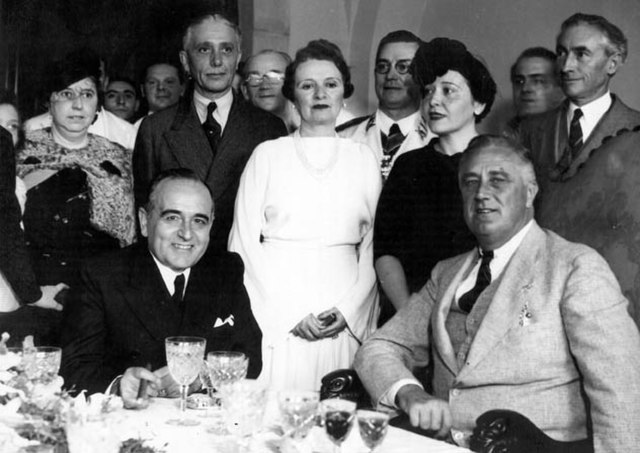The Good Neighbor policy was the foreign policy of the administration of United States President Franklin D. Roosevelt towards Latin America. Although the policy was implemented by the Roosevelt administration, President Woodrow Wilson had previously used the term, but subsequently went on to justify U.S. involvement in the Mexican Revolution and occupation of Haiti. Senator Henry Clay had coined the term Good Neighbor in the previous century. President Herbert Hoover turned against interventionism and developed policies that Roosevelt perfected.
Brazilian President Getúlio Vargas (left) and US President Franklin D. Roosevelt (right) in 1936
Nelson Rockefeller, Coordinator of Inter-American Affairs (1940)
Carmen Miranda became the muse of the Good Neighbor policy.
Pamphlet describing Chile as a "tourist paradise" during the 1939 World's Fair
United States occupation of Haiti
The United States occupation of Haiti began on July 28, 1915, when 330 U.S. Marines landed at Port-au-Prince, Haiti, after the National City Bank of New York convinced the President of the United States, Woodrow Wilson, to take control of Haiti's political and financial interests. The July 1915 invasion took place following years of socioeconomic instability within Haiti that culminated with the lynching of President of Haiti Vilbrun Guillaume Sam by a mob angered by his decision to order the executions of political prisoners. The invasion and subsequent occupation was promoted by growing American business interests in Haiti, especially the National City Bank of New York, which had withheld funds from Haiti and paid rebels to destabilize the nation through the Bank of the Republic of Haiti with an aim at inducing American intervention.
Image: American Marines In 1915 defending the entrance gate in Cap Haitian 34510
Image: Occupation of Haiti
Image: Airplanes, Haiti, circa 1919 (15513536936)
USS Philadelphia, flagship of the fleet involved in the 1890 Môle Saint-Nicolas affair which saw the United States using gunboat diplomacy in an attempt to obtain Môle-Saint-Nicolas








